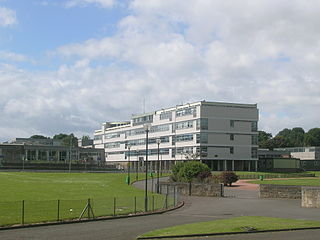Related Research Articles

The General Certificate of Secondary Education (GCSE) is an academic qualification in a particular subject, taken in England, Wales, and Northern Ireland. State schools in Scotland use the Scottish Qualifications Certificate instead. Private schools in Scotland may choose to use GCSEs from England.
In the education systems of England, Northern Ireland, Wales, Jamaica, Trinidad and Tobago and some other Commonwealth countries, sixth form represents the final two years of secondary education, ages 16 to 18. Pupils typically prepare for A-level or equivalent examinations like the IB or Pre-U. In England, Wales, and Northern Ireland, the term Key Stage 5 has the same meaning. It only refers to academic education and not to vocational education.
The General Certificate of Education (GCE) is a subject-specific family of academic qualifications used in awarding bodies in England, Wales, Northern Ireland, Crown dependencies and a few Commonwealth countries. For some time, the Scottish education system has been different from those in the other countries of the United Kingdom.

The Scottish Qualifications Authority is the executive non-departmental public body of the Scottish Government responsible for accrediting educational awards. It is partly funded by the Education and Lifelong Learning Directorate of the Scottish Government, and employs approximately 750 staff based in Glasgow and Dalkeith.
Standard Grades were Scotland's educational qualifications for students aged around 14 to 16 years. Introduced in 1986, the Grades were replaced in 2013 with the Scottish Qualifications Authority's National exams in a major shake-up of Scotland's education system as part of the Scottish Credit and Qualifications Framework overhaul.
In the Scottish secondary education system, the Higher is one of the national school-leaving certificate exams and university entrance qualifications of the Scottish Qualifications Certificate (SQC) offered by the Scottish Qualifications Authority. It superseded the old Higher Grade on the Scottish Certificate of Education (SCE). Both are normally referred to simply as "Highers".
In the Scottish secondary education system, the Certificate of Sixth Year Studies (CSYS) was the highest level of qualification available to pupils from 1968 until circa 2000.
The National Certificate of Educational Achievement (NCEA) is the official secondary-school qualification in New Zealand. Phased in between 2002 and 2004, it replaced three older secondary-school qualifications. The New Zealand Qualifications Authority administers NCEA.
The Certificate of Secondary Education (CSE) was a subject-specific qualification family awarded in both academic and vocational fields in England, Wales and Northern Ireland. CSE examinations were held in the years 1965 to 1987. This qualification should not be confused with the Indian Certificate of Secondary Education which is the school leaving qualification in India. Also, in some African and former British colonial countries there is a qualification named the Certificate of Secondary Education based on the original and former British variant. Also, the CSE should not be confused with the African qualification CSEE.
The Advanced Higher is an optional qualification which forms part of the Scottish secondary education system brought in to replace the Certificate of Sixth Year Studies (CSYS). The first certification of Advanced Higher was in 2001. It is normally taken by students aged around 16–18 years of age after they have completed Highers, which are the main university entrance qualification in Scotland.
The Ordinary Grade of the Scottish Certificate of Education is a now-discontinued qualification which was studied for as part of the Scottish secondary education system. It could be considered broadly equivalent to the old English O-Level qualification and is the predecessor to the Standard Grade.
The Scottish Qualifications Certificate (SQC) is the successor to the Scottish Certificate of Education and the Record of Education and Training, and is the main educational qualification awarded to students in secondary, further, and vocational education. The SQC is awarded by the Scottish Qualifications Authority. It forms part of the wider array of qualifications available in the Scottish education system, including Scottish Vocational Qualifications, Higher National Certificates and Higher National Diplomas. Each level is fully integrated with the Scottish Credit and Qualifications Framework and the three upper levels are awarded UCAS Tariff Points.
The UCAS Tariff is used to allocate points to post-16 qualifications. Universities and colleges may use it when making offers to applicants. A points total is achieved by converting qualifications, such as A-Levels, into points, making it simpler for course providers to compare applicants. It is used as a means of giving students from the United Kingdom places at UK universities.

The A-Level is a subject-based qualification conferred as part of the General Certificate of Education, as well as a school leaving qualification offered by the educational bodies in the United Kingdom and the educational authorities of British Crown dependencies to students completing secondary or pre-university education. They were introduced in England and Wales in 1951 to replace the Higher School Certificate. The A-level permits students to have potential access to university if their grade is of satisfactory quality.

The O-Level is a subject-based qualification conferred as part of the General Certificate of Education. It began in the United Kingdom and has been adopted, often with modifications, in several other countries.
In the UK education sector, there are a wide range of qualification types offered by the United Kingdom awarding bodies. Qualifications range in size and type, can be academic, vocational or skills-related, and are grouped together into different levels of difficulty. In England, Wales and Northern Ireland, qualifications are divided into Higher Education qualifications, which are on the Framework for Higher Education Qualifications (FHEQ) and are awarded by bodies with degree awarding powers, and Regulated qualifications, which are on the Regulated Qualifications Framework (RQF) and are accredited by Ofqual in England, the Council for the Curriculum, Examinations and Assessment in Northern Ireland and Qualifications Wales in Wales. In Scotland, qualifications are divided into Higher Education qualifications, Scottish Qualifications Authority qualifications and Scottish Vocational Qualifications/Modern Apprenticeships, which are on the Scottish Credit and Qualifications Framework (SCQF). Scottish Higher Education Qualifications are on both the SCQF and the FHEQ.
The General Certificate of Education (GCE) Advanced Level, or A Level, is a main school leaving qualification in England, Wales, Northern Ireland, the Channel Islands and the Isle of Man. It is available as an alternative qualification in other countries.

Secondary education in Scotland can take up to 6 years, covering ages 11 to 18, from S1 to S6. Education is not compulsory after the age of 16, the age of majority in Scots law.

The General Certificate of Education (GCE) Ordinary Level, also called the O-level or O level, was a subject-based academic qualification. Introduced in 1951 as a replacement for the 16+ School Certificate (SC), the O-level would act as a pathway to the new, more in-depth and academically rigorous A-level, in England, Wales and Northern Ireland. Later, the complementary and more vocational Certificate of Secondary Education (CSE) was added to broaden the subjects available and offer qualifications in non-academic subjects.

Education in Scotland in the twentieth century includes all forms of organised education in Scotland, such as elementary, secondary and higher education. The centre of the education system became more focused on Scotland throughout the century, with the Scottish Education Department partly moving north from 1918 and new departments created by the Scottish Executive after devolution.
References
- ↑ "Notes and news". British Journal of Educational Studies. 8: 65. doi:10.1080/00071005.1959.9973030.